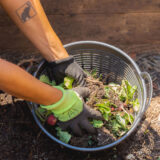Intro to Composting
Whether you live in a house with a backyard or an apartment with no access to green space, you can compost! Led by NYBG experts, this course will guide you through the fundamental principles of composting.

Ready to set off on your journey into the plant world? With our online, self-paced courses, you can hone your skills in a variety of botanical areas through pre-recorded courses that feature virtual tours of garden spaces and interactive learning.
Courses are easy to take at your own pace using the online learning platform Canvas! These courses include pre-recorded videos featuring NYBG’s plant professionals, who will guide you through the material. Videos include quizzes and reflection points that are designed to deepen your understanding of the course content. You’ll have access to all videos and quizzes for 60 days after the course start date, allowing you to complete it at any time within that period.

Whether you live in a house with a backyard or an apartment with no access to green space, you can compost! Led by NYBG experts, this course will guide you through the fundamental principles of composting.
Stay tuned for more self-paced course offerings!
Course content is organized in modules through pre-recorded videos with the Garden’s plant professionals, showcasing both the expertise and the beauty of The New York Botanical Garden. Each course may include video lectures, readings, and quizzes.
Students who complete course requirements will receive a digital credential from NYBG that can be shared on social media. All courses include a 60-day access period, so that you can learn at your own pace, on your own time, anywhere in the world, in the style that works best for you.
Self-paced courses are accessed through NYBG’s learning management system, Canvas, which supports online learning. In Canvas, students can view course videos and read announcements. For more information about how Canvas works, please see our FAQs on online classes.